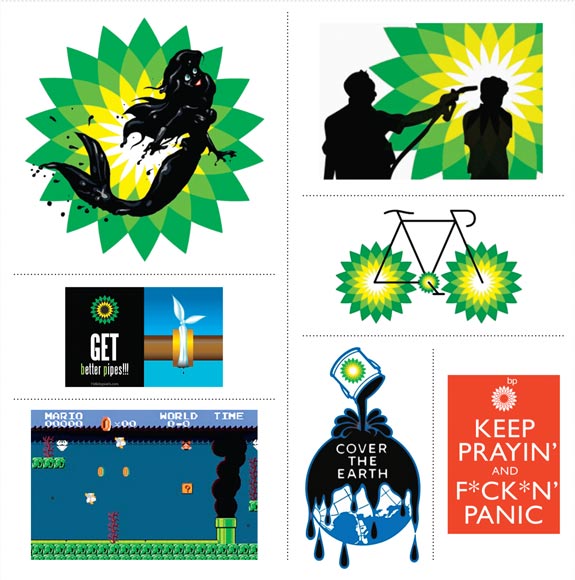EnlargeOh No, You Didn't! Leroy Stick, on stage at TedxOilSpill, has led a Twitter battle against BP. | Photograph by Kris Krug
@BPGlobalPR We regretfully admit that something has happened off of the Gulf Coast. More to come. 3:07 PM May 19th via web
A young comedy writer awoke one morning a month after the Deepwater Horizon explosion and caught a video of the Coast Guard ordering reporters off a Mississippi beach. "It made me angry," the man now known publicly as Leroy Stick tells Fast Company. "It was just so clear to me that BP cared more about saving their brand than they did about saving the Gulf of Mexico. So I decided to make fun of their brand and their PR efforts on Twitter."
That first tweet opened lesson 1,001 in an ongoing course titled "In the Age of Social Media, You Do Not Control Your Brand." @bpglobalpr quickly picked up more than 190,000 followers, while the company's own account, the hastily started @bp_america, languished at a tenth of that. As the company made ham-fisted attempts at spin (Photoshopped helicopter, anyone?), Stick and his team provided a much-needed outlet for the public's outrage. Stick stayed in venal, clueless, and often hilarious character online, in the media, and in public appearances. "Comedy can be a great tool for telling the truth just because there aren't any rules," says Stick, who still declines to reveal his real name. "You can use satire to raise real awareness." With the well finally capped and Tony Hayward relieved of his CEO post at last, the big takeaway for corporations may be, to quote a BPGlobalPR -- created T-shirt: forget your brand. Tweets are cheap; it's what companies do, not what they say, that really matters.
Activists have donned suits in mockery at least since 1967, when Abbie Hoffman and the Yippies tossed dollar bills onto the floor of the New York Stock Exchange. More recently, the Billionaires for Bush bird-dogged the RNC, and the Yes Men, a pair of pseudonymous activist-pranksters, starred in two documentaries in which they impersonate reps from Halliburton, the WTO, and Dow Chemical. (Stick shares a lecture agent with the Yes Men and calls them "rock stars.")
These days, venting anti-corporate anger is as easy as retweeting a joke, Photoshopping a parodic BP logo with an asphyxiating sea turtle, or creating a YouTube video called "BP Spills Coffee" (which has tallied more than 10 million views). Satire can help hold the powerful accountable when the public's attention threatens to wane. "It really comes down to storytelling -- if you don't tell your story well, someone else will tell it for you," says sustainability expert Joel Makower, executive editor of GreenBiz.com. "BP is an example of how companies' misfortunes are going to unfold going forward with all the tools and weapons the Internet and social media afford."
BP presented a burlesque of corporate hypocrisy that not even Hoffman could have conjured: The oil company with the worst safety and environmental record of the Big Six is also the author of "Beyond Petroleum," one of the most successful green-rebranding campaigns ever seen. The real problem here was not that BP made PR mistakes; it was that their PR was too good. "Companies screw themselves when they let perception get ahead of reality," Makower says. "BP did a fabulous job with 'Beyond Petroleum,' but less than 1% of their revenue has ever come from renewables."

Ann Hand, who was BP's SVP of global brand and marketing during the heyday of the green-starburst campaign, later left to become CEO of Project Frog, which makes prefabricated high-tech green buildings for schools, health care, and retail. "With the Internet, I think branding is probably harder because you need to make sure that you're backing it up in the marketplace, that you have a culture that supports it and consistently lives up to that brand," she says. "It's been enjoyable for me to come to a company where we have measured results and happy customers." Better metrics -- millions paid in restitution to fishermen, acres of wetlands restored, and new dollars invested in green energy -- will be key if BP is to have any hope of regaining an estimated billion dollars in lost brand equity and immeasurable public trust.
Activists, for their part, hope that public scrutiny doesn't start and end with the click of a button. "I like the term 'slacktivism,' " says Nate Mook, the software entrepreneur behind TEDxOilSpill, a grassroots conference of scientists, environmentalists, and clean-energy advocates that featured Stick as a speaker. Mook argues that there must be more paths created for ordinary people to get involved, whether by donating money or by stirring interest with contests such as the Oil Cleanup X Challenge, a $1.4 million prize backed by Google CEO Eric Schmidt's wife, Wendy. "That's where you see social media being powerful," Mook says, "when it connects people to bring about real change."
Related Stories:
Topics:
Technology, Leadership, Management, Magazine, BP, deepwater horizon, social media, Joel Makower, GreenBiz.com, Ann Hand, project frog, tedxoilspill, Leroy Stick, BP plc, Fossil Fuel Energy Production, Abbie Hoffman, Nate Mook
Thursday, September 23, 2010
Why Environmental Activists Embrace Social Media | Fast Company
via fastcompany.com
Subscribe to:
Post Comments (Atom)






No comments:
Post a Comment